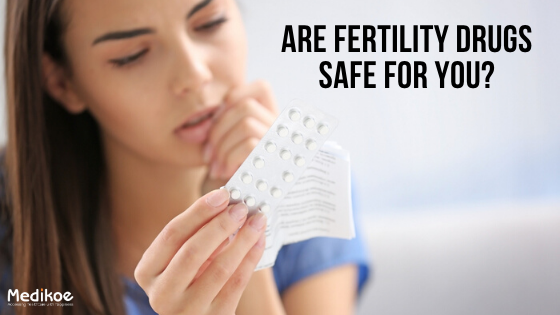Are Fertility Drugs Safe For You?
Author : Dr. Monica Sachdeva
Date : 20 Nov 2019
Overview
The majority of women who seek treatment for infertility will be treated with fertility drugs or have surgery. Most frequently asked question is about the safety of fertility drugs.
Fertility drugs exist in the market since 1967; it’s been forty years since the birth of Baby Louise via test tube and approximately eight million babies have been born using in vitro fertilization or other procedures. The best part of infertility treatment is that no adverse effects are seen with fertility drugs.
Fertility Drugs to Stimulate Ovulation
Fertility drugs can be used by a woman who has infrequent ovulation or doesn’t ovulate at all. This is called “ovulation induction”, and the goal is to achieve the ovulation of one or two eggs. Either clomiphene, letrozole or gonadotropins may be used. Often, intrauterine insemination (IUI) is performed at the time of ovulation. Or, if ovulation is regular, but a woman is not getting pregnant, a fertility drug may help produce more than one egg at a time. This is called “ovarian stimulation” and clomiphene or letrozole may be used and, much less often, gonadotropins.
Fertility Drugs as Part of IVF
Medication is almost always part of the protocol for IVF, to obtain more eggs for fertilization to create embryos, to freeze eggs or be an egg donor. This process of “ovarian stimulation” aims to produce many eggs at one time and almost always utilizes gonadotropins. Studies show that 10-15 eggs are ideal for IVF and doctor will calculate the dosage according to age, and body mass index to achieve this outcome.
Are fertility drugs safe to take?
History and research to date say yes. The most severe complication is ovarian hyperstimulation syndrome (OHSS) which usually occurs during the cycle or soon after, and is more common if pregnancy occurs. It causes enlargement of the ovaries, fluid retention, and weight gain. Symptoms may be mild to severe and, if the latter, may rarely be potentially life-threatening. OHSS is “an uncommon but serious complication” according to ASRM. Estimates suggest it occurs in a moderate or severe form in only 1 to 5 per cent of cycles. Research often cited by clinicians show that severe OHSS occurs in just 0.03 per cent of cycles.
Hospitalization for OHSS “is almost unheard of now” compared to twenty years ago. Strategies for identifying high-risk patients and treating the condition have advanced in recent years. Most cases of OHSS are entirely avoidable.
Standardized Dosing Regimens of Fertility Drugs
Professional societies for fertility specialists have developed standard dosing regimens, but every protocol is customized to fit an individual woman’s health and size. At the same time, there is nothing to prevent doctors from using larger doses.
Currently, there is no systematic way to track dosages or outcomes of fertility drugs. The Society for Assisted Reproductive Technology (SART) in the United States is now tracking drug doses so some better information on this complication will become available in the next few years.
Beyond the rare occurrence of OHSS, researchers have not found any long-term effects for taking fertility drugs. According to experts, the short-term increase in estrogen – usually ten days for IVF – is “unlikely to have a profound long-term effect on a woman’s body.” More research is recommended given the association between estrogen and growth of some cancers.
Fertility Drug Safety Studies
Extensive studies in Denmark and Sweden looked at women who took fertility drugs – 50,000 and 24,000, respectively – and found no connection between fertility drugs and ovarian cancer. Data on ovarian cancer presented last June at a European scientific conference also showed no increased risk. Further, a British study of 250,000 women found no increased risk for breast cancer or invasive uterine cancer among those who underwent infertility treatment using medication
According to current ASRM guidelines “there does not appear to be a meaningful increased risk” of invasive ovarian, breast or endometrial cancer for fertility patients “based on available data.” They do acknowledge that for borderline ovarian tumours “several studies have shown a small increased risk.” There is no consensus on colon cancer, and more research has been recommended.
There’s no doubt infertility treatment is complicated – many factors are considered when IVF specialist develops an individualized treatment protocol. Although each case is unique, having a thorough discussion of the benefits and risks of what the doctor recommends for the best chance of having a healthy baby applies to everyone.
With no long term side effects and avoidable risks, fertility treatment falls into a safe category. The apprehensions related to fertility drugs should never deter a couple from having fertility treatment.

